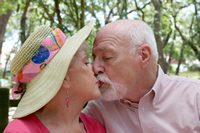Sex After Stroke


A stroke can change how someone walks, talks, thinks and feels. If that person is your spouse or partner, a stroke can also affect your sexual relationship.
What Do You Need to Know?
After a stroke, sex may be difficult. It can be hard to talk about but it is important. Talk to each other about your feelings. Seek help from your healthcare team, if needed.
What Are Physical Reasons Why Sex May Be Difficult?
Erectile Dysfunction (ED)
The male survivor may have trouble getting or keeping an erection. This may be a direct result of stroke. It may also be a result of poor health, stress or depression. ED can be treated in different ways. Lifestyle changes like stopping smoking and eating healthier may help. Medicines like Viagra®** can be prescribed. Talk to your healthcare team about treatment. The MedlinePlus Web site has information on erectile dysfunction. Go to the Resources section at the end of this fact sheet for a link to the site.
Vaginal Dryness
The female survivor may have vaginal dryness. She may take longer to become sexually excited. A vaginal lubricant like KY Jelly®** may help to make sex more comfortable. Be patient and take your time.
Immobility
Stroke may cause decreased movement in the arms and/or legs. The survivor may suffer from paralysis (lack of movement). There may also be weakness or spasticity (rigid muscles). To help, support the affected side with pillows during sex.
Incontinence
The survivor may be unable to hold urine or bowel movements after stroke. They may be afraid of having an accident during sex. Have your loved one use the bathroom before sexual activity. Learn more about incontinence.
Fatigue
Lack of energy and motivation can limit many activities, including sex. Rest and a healthy diet may help. Have your loved one conserve energy when possible. You may need to take on the more active role during sex. Learn more about fatigue after stroke.
Side-Effects of Medicines
Some medicines may lessen sexual desire or activity. Medicines that treat high blood pressure and depression often cause sexual problems. Talk to your healthcare team about your concerns.
How Can Changes in Emotions Affect Sex?
Fear of another stroke − The survivor may worry that sex could cause another stroke. This is a common concern after stroke. Sexual activity can begin again when the survivor is ready. Talk to your healthcare team about your concerns.
Decreased libido (desire for sex) − This is common after stroke. Changes in body image may cause low self-esteem. This can affect your loved one’s desire for sex. It may take time for the survivor to feel attractive and desirable again. Be patient and supportive. Seek professional counseling if needed.
Depression (feeling blue) − Brain injury and changes after a stroke often lead to depression. Your loved one may feel sad or guilty about needing your help. Encourage your loved one to talk about their feelings. Talk with your healthcare team.
Are You Having a Hard Time Adjusting?
Depression can be treated. Learn more about depression after stroke.
If you find you are having a hard time adjusting, it may be because of some of these changes:
Altered Appearance
Your partner’s physical appearance may have changed. You may not feel the same sexual attraction. Give yourself time to adjust. Focus on the emotional connection you share.
Role Change
You may have difficulty shifting from giving physical care to being a lover. Make time to spend with your loved one to reconnect.
Depression
Caregiving can make you feel sad. It can decrease your desire for sex. Depression can be treated. Talk to your healthcare team. Learn more about caregiver depression.
What Treatments Should You Discuss with Your Healthcare Team?
If you are worried about your sexual relationship, you are not alone. Talk to your healthcare team about your concerns. Don’t be afraid to seek couples counseling. Most stroke survivors are able to resume sexual activity with time. If sexual intercourse is not possible, remember that there are other sexual activities that you can enjoy.
Helpful Tips
- Plan for sexual activity in advance. Allow for privacy and adequate time.
- Explore different positions to see what is most comfortable for both of you. Be creative and have fun.
- Take your time and enjoy each other’s company.
Remember
- Share your feelings with each other.
- Talk to your healthcare team. There are treatments and ways to improve your sexual relationship.
- Be patient and offer support.
More Resources 
Additional credible resources on this topic can be found here. Website pages may change or update, therefore if a link does not work, you may also try to type the information into your internet search bar. This Resource List will be updated frequently.
|
*Link Disclaimer: Links to information and Web sites outside of the Department of Veterans Affairs do not indicate an endorsement of products or services offered by the sites. In addition, these sites may have privacy and security policies that are inconsistent with those of VA. |
References: National Stroke Association. (2006). Stroke Facts; Recovery after Stroke: Redefining Sexuality. Retrieved June 18, 2008, from: http://www.stroke.org/site/DocServer/NSAFactSheet_Sexuality.pdf?docID=999*; American Stroke Association. (2008). Sexual Activity and Heart Disease or Stroke. Retrieved June 18, 2008, from: http://www.strokeassociation.org/presenter.jhtml?identifier=9065*; Vegas, J. (2008). Sexuality after Stroke. Retrieved June 18, 2008, from About.com: http://stroke.about.com/od/caregiverresources/a/sex_and_stroke.htm?p=1*; Heart & Stroke Tayside. (September 11, 2007). Sex after Stroke Illness. Retrieved June 18, 2008, from: http://www.heartstroketayside.org.uk/default.aspx?navigationid=359*.
These materials were created for the project:
Web-Based Informational Materials for Caregivers of Veterans Post-Stroke
Project Number SDP 06-327 funded by VA HSR&D Quality Enhancement Research Initiative (QUERI)



















